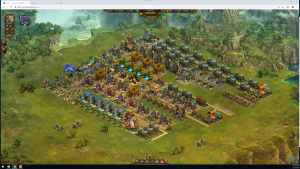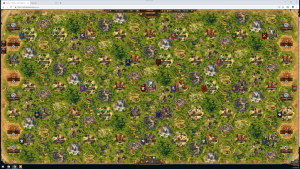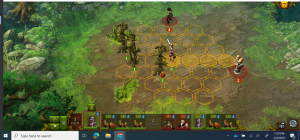Pre Gameplay Questions:
What will I like / dislike about it?
- I don’t usually play games so I don’t think I will enjoy it
- I like Lord of the Rings and Game of thrones so maybe I will like the concept?
- I do not think I will be very good at it
- I will enjoy that the concept is simple
What will I find interesting about it/boring or tedious about it?
- I will not want to spend time learning the rules
- I don’t think I will find the deeper storyline interesting. I usually do not care much for fantasy type things
- I will find the explanation and back story, introduction learning section tedious but necessary
- I will find the unique world and how it operates interesting
- I will find it interesting and fun if there is a competitive aspect
What will I need to do in it?
- I think I will need to build a civilization from the ground up
- I will need to organize a town and help it grow
- I will need to fight the humans or elves depending on which side I am on
What will I need to learn within it?
- I will need to learn the rules, what type of society it is, how do I build etc
- I will need to learn the controls and how to actually play the game
- I will need to learn the strategy
- I will need to learn how to navigate the platform
- I will need to learn who I work with or want to stay away from to survive
What will it be like / similar to (other games I have played)?
- Probably not like many games I know because I don’t play much
- Maybe similar to Catan
- Could be similar to SIMS
- Not going to be similar to mario cart or racing games I have played
- Could be similar to building blocks or other games that involve constructing/building/designing
Before playing Elvenar, I expected to find the concept interesting but the initial gameplay tedious, as I typically do not enjoy learning complex game mechanics. My expectations were based on my limited gaming experience and my past experiences of not understanding or succeeding in complicated video games.
Solo Playthrough:
Descriptive Notes Just write as you play — write anything descriptive, records of objectives, hints, fragments of ideas, anything. You may elect to write as you play (i.e. pausing the game) or right after you have completed a play session.
- Elves or humans? Not sure if the game would be different or if it matters but I chose elves. (Maybe because it seemed like a female)
- Did not understand at first what the point was
- Brief intro says to start building so I put buildings around randomly. Need to be connected to paths it says but I am not sure where the paths should go
- Interface has lots of menus that I do not understand and it is somewhat hard to see
- Not sure the steps to take
- Not super intrigued by the graphics. I didn’t find the imagery easy to follow or captivating
- A lot of info bubbles. Thankfully they are telling me what to do but they are going on for a long time
- Found it boring because I had to click where they told me in order to understand what to do but I still did not see how all of the tasks fit together
- There were some objectives to start that told me what to do first (build two factories etc)
- Told my building needed to connect to main hall
- Couldn’t build out until expansion
- I sometimes just clicked something to see what would happen
- I am not decisive so I made decisions slowly
- I shared the game with my sister a bit and laughed at not having a clue
- Objective to build homes and get more workers and to explore other provinces
- I absolutely hate waiting for more coins and just having to sit around but I did want to gain more money so I could build
- I built roads without really knowing where they should be placed
- Clicked on resources to get but did not know why or how to choose the best ones
- Not sure which resources to pick or what it means by how long they take to get (1 day? How can someone play the game for a day?)
- Enjoyed clicking the money. Didn’t realize for a while I needed to in order to get the money, thought it was automatic
- I did a few battles and bought a few things before I probably should have
- I did not want to sit around and wait for money to build up
- I was hesitant when posed with decisions
- Decided to negotiate not fight
- Negotiated many times and it felt too easy
- Wasn’t sure it was correct so decided to fight
- Just randomly chose battle fighters without reasoning
- Tried the fight and failed a few times
- After I battled a few times I began to understand how it worked and wanted to do a few more
- Building more houses but there is no room
- Need to move buildings
- Can’t remember what I spent them on but I spent diamonds too early and then found out they are really hard to get
- built up my workers and had negotiated and explored as much as I felt I could
Analytic Notes: After playing, consider your experience more holistically — What problems did it present me with? What options did it give me (to address those problems)? When and how does the game invoke gender, class, race, violence in ways that might be problematic? What about learning? Does anything stand out as a ‘defining’ or ‘unique’ feature of the game?
- The question of negotiate or fight
- Should I support my neighbour or take over their land/ fight them
- Short term vs long term goals
- How to manage resources
- What is valued in society (culture, goods, land)
- Made me consider taking care of my “people” and felt pressure to make good decisions
- Gender- was shown in the starting options
- Colonialism- taking over others land shows power
- Stressing knowledge as a huge asset
- Experiential learning
- Scaffolded learning- there were supports in place at first to guide me but then after a while I was more on my own
Affective Notes: Playing and analyzing games are subjective activities — as you played, you were likely: engaged, irritated, startled, sympathetic, angry, bored, etc. Identify the affective responses you had while playing, and do your best to account for the in-game circumstances that gave rise to them (i.e. where, when, intensity, etc.) Don’t worry about being exhaustive, just mention what you think matters
- I was frustrated at the start not knowing what I was doing. I had to read a lot and then try to figure it out
- I started to get angry once the initial supports were gone and I had to figure it out on my own but couldn’t until finally I started to get it
- I was bored waiting for resources to build up
- I was engaged during the battles after I understood them
- I was laughing and enjoying myself when my sister came in and I was showing her the game and how bad I was at it
- Satisfying when I finish things like quests but I still felt frustrated not knowing for sure if I was making the right long term decisions
- I felt motivated to keep playing as my money and resources started to build up
Learning Elvenar was initially frustrating due to the overwhelming interface and slow progression, but I gradually developed an understanding of the game’s mechanics through trial and error. Learning to manage and get resources was the most important for getting a ‘handle’ on the game.
Video Observation
https://www.twitch.tv/videos/2300012753
Descriptive Notes: Document what the player is doing, paying attention to, ignoring, prioritizing, but also what they are talking about (i.e. what they verbally frame as important during the playthrough). Make notes of what the player is paying attention to, prioritizing, and/or ignoring and if and how that is different from your play.
- First thing is building houses and workshops
- Pays attention to money and resources and cashes them
- Even the guy explaining it found himself missing details because there was so much to know
- Wanted lots of workers to be constantly working so they needed housing
- He is building his houses in a straight line where as mine didn’t have much reasoning to it
- Focused on economy first and army second
- Doesn’t care what character he is
- Needs to complete missions to get rewards
- Placed buildings with strategic thought where as mine we just random
- Organized all the workshops in one spot and all the housing in one spot
- He built things much much faster than me. I was already wanting to explore battles etc and he was only focused on building resources and his workers
- He focuses on the missions given to him whereas I did not even see that tab. I just explored on my own
- Wanted to unlock resources as soon as possible. I only got one unlocked. I didn’t really know what the benefit was but he seems to have clear understanding of which is best
- I thought you might want some of all resources but he was more focused on the efficiency of how to make the most resources regardless of type
- Left one knowledge incomplete on purpose. Not sure why
- Wanted to get all of the knowledge possible
- He didn’t even play out the fights. He did them all in about 2 seconds whereas I actually played them
- He seemed to already know he would win the fight
- He did not pay attention to the instructions or pop ups because he just knew what they were
- Focused on how long the building would be working (how long he would be away from the computer)
- Would go in and out of totally different worlds…I didn’t even know there were other worlds to go to
Analytic Notes: Review your descriptive notes and consider the problems the player encountered and the strategies/ solutions that they enacted. Furthermore, consider how the player navigated/commented on issues/ structures of race, gender, class, and violence. What did you notice about the game when you watched, as opposed to when you played? Hold off on making any big conclusions for now
- Strategies for time management to get the most resources (set them for one day) even set an alarm to check back into the game
- I noticed more of the reasoning behind different buttons for navigation on the screen
- I understood more about how each section connected with the next
- I understood more of the long term planning
- I understood the battles more and how to choose your warriors
Affective Notes: What affective responses did you observe the player having while playing? What evidence did you have of their affective response/s? What did they choose to focus on? How were they different from responses and focus/foci you had? Pay specific attention to instances where you were surprised by something the player said or did. And if possible, reflect on how affective responses impact the ‘learning’ or ‘engagement’ you think can be recognized and documented from this observed play session.
- I didn’t notice much of an affective response. Most of the time they just seemed confident and very matter of fact that they knew what they were doing
- Starting the game they did not show or say anything about being frustrated
- They did say that having to wait around was not the best but that it was necessary
- Mostly seemed “excited” when they were talking about optimizing efficiency like laying out their city in an efficient organized way or if they were collecting lots of resources.
- They seemed very confident
- They did not seem excited by the stories narrative or talk about much to do with that
Watching a more skilled player, I noticed they were all about efficiency—optimizing resources, organizing buildings, and making quick decisions without hesitation. While I was busy exploring and figuring things out, they focused on long-term strategy, completing missions fast, and maximizing their progress with minimal downtime.

Bridge
A fundamental way games create engagement is through their overarching premise, which provides context for the formal elements (Fullerton, 2014, p. 45). Civilization-building strategy games like Elvenar exemplify this, offering players the choice between human and elvish civilizations within a single-player versus game structure (Fullerton, 2014, p. 59). The game revolves around resource management, constructing buildings, and expanding territory, with time mechanics playing a crucial role in player progression.
My experience with Elvenar, as a very inexperienced gamer, presented several challenges, especially in contrast to the experienced gamer I observed. The learning curve required me to “explore and probe the world” (Gee, 2008, p. 232), making strategic mistakes along the way. Initially, I struggled to grasp the game’s procedures and rules, spending considerable time simply navigating the interface. Meanwhile, the experienced player quickly maximized their efficiency, effectively navigating the game’s financial and resource systems. Elvenar aligns with Fullerton’s (2014) description of formal game elements, particularly in its use of objectives, resources, and conflict (pp. 68-72). The primary objective is to grow and manage a thriving city by balancing production efficiency, trade, and military expansion. Resources such as coins, beverages, tools, and groceries meet Fullerton’s definition of game resources as elements that must have both “utility and scarcity” (2014, p. 80). This scarcity became apparent when I misused diamonds early on, a mistake the experienced player avoided due to their understanding of the resource and its value. Time also functions as a resource, as many game actions require waiting for resources or building to occur. Conflict arises in Elvenar not through direct player competition but through economic and decision-making challenges, such as choosing between negotiation or combat for expansion.
Elvenar has a construction-based objective with resource management as a core gameplay element. Success is determined by strategic choice-making rather than chance or physical dexterity (Fullerton, 2014). I did enjoy this because, as Fullerton notes, these can be somewhat open to player interpretation as to what success is within the game; for example, what type of city I wanted to build was ultimately up to me. Where the gamer succeeded much more than me was the mini or partial objectives that help players to accomplish the main objective (Fullerton, 2014). I took way too long to realize how exactly smaller tasks like gathering knowledge, resources, and exploration all connected.
Elvenar values expansion and territory growth. Although there was some emphasis on culture through the ability to place cultural elements in the cities, societal values seemed to be centered on power. Marshall McLuhan’s perspective on games as cultural reflections stuck out to me. The mechanics of expansion in Elvenar highlight historical patterns of colonialism, dominance, resource control, and territorial disputes, emphasizing how games can mirror the real world and its core values (Egenfeldt-Nielsen, Smith, & Tosca, 2020). Compared to action-oriented games, Elvenar is a slower-paced, decision-driven experience that aligns with Gee’s (2017) concept of games as “distributed teaching and learning systems.” The game teaches through trial and error rather than direct instruction, requiring players to discover efficient strategies over time. While I initially found myself reacting to immediate needs without long-term planning, the experienced player methodically optimized city layouts and resource production, demonstrating a deeper understanding of the game strategy.
Even though Elvenar doesn’t follow a traditional story like many narrative games, it still creates drama through its city-building mechanics and challenges. The absence of a strong character means that engagement is not character driven, but instead comes from players assuming the role of a city leader. Over time, I felt an increasing sense of responsibility for my city and its inhabitants, trying my best to make decisions with their well-being in mind. The engagement comes from the drama of your chosen strategy and seeing how it unfolds (Fullerton, 2014, p. 45). One of the most interesting takeaways from comparing my experience with that of the experienced player was how different players find enjoyment in Elvenar. The experienced player treated it as a game of efficiency and long-term planning, while I initially found it overwhelming. He even set alarms to return to the game at optimal times, ensuring maximum resource collection and production. This reinforced Castronova’s critique of the ‘magic circle’, the boundary between games and reality is not rigid, as the real world seeps into games, and in this case, the game influenced real world behavior as well (Egenfeldt-Nielsen, Smith, & Tosca, 2020). I was not engaged enough to take the same route however my enjoyment grew as I became more comfortable with the mechanics. This aligns with Gee’s (2008) assertion that the “fun” of a game comes from problem-solving and mastery of its mechanics. Similarly, Fullerton (2014) highlights that challenge is highly individualized; an appropriate level of challenge fosters engagement (p. 98). As a novice, certain challenges initially hindered my engagement, but as I learned, they became dynamic. For example, battles started as frustrating obstacles but eventually I learned what each fighter’s strengths were and how to maneuver them to win.
Ultimately, Elvenar is a strategy game that engages players through systems rather than traditional storytelling. Its reliance on resource management, time-based progression, and player decision making makes it an enjoyable experience. While it presents challenges to new players like myself, the game rewards those who develop long-term strategies, reinforcing the idea that games are both learning environments and engaging experiences. Reflecting on my experience, I identify more as a competitor or achiever in terms of player type. However, Elvenar seems better suited to a craftsman or collector playstyle (Fullerton, 2018, p. 104). While I enjoyed aspects of strategic planning, the game’s emphasis on slow, methodical progress and optimization may appeal more to those who enjoy meticulous world-building rather than direct competition. Gee and Gee (2017) suggest that through games, we engage in a conversation with a new world. I agree with this perspective; however, as an inexperienced player, Elvenar felt like speaking a new language, one I had to slowly decode through trial and error. I also recognize that my limited experience prevented me from fully accessing everything the game had to offer. Given more time, I may have developed a deeper appreciation for it. Watching an experienced player navigate the game with ease highlighted how expertise definitely transforms the experience. This assignment and course have exposed me to a world I rarely visit, but one I now appreciate and understand much more.
References:
Egenfeldt-Nielsen, S., Smith, J. H., & Tosca, S. P. (2020;2019;). Understanding video games: The essential introduction (4th ed.). Milton: Routledge. doi:10.4324/9780429431791 – Read chapter entitled: “What is a Game?”
Fullerton, T. (2014). Game Design Workshop: A Playcentric Approach to Creating Innovative Games, NY: Taylor & Francis (CRS Press)/ Chapters 1, 2, 3.
Gee, J. P. (2008). Cats and portals: Video games, learning, and play. American Journal of Play, 1(2), 229.
Gee, E., & Gee, J. P. (2017). Games as distributed teaching and learning systems. Teachers College Record, 119(11).



